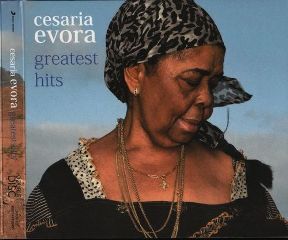Cesaria Evora - Greatest Hits (2010)
Cesaria Evora - Greatest Hits (2010)

CD1:
01. Besame Mucho
02. Serpentina
03. Velocidade
04. Um Pincelada
05. Ligereza
06. Sangue De Beirona
07. Nho Antone Escaderode
08. Amar Di Mundo
09. Sao Vicente Di Longe
10. Sentimento
11. Mar Nha Confidente
12. Isolada
13. Sodade play
14. Nha Cancera Ka Tem Medida
15. Petit Pays
16. Miss Perfumado
17. Cintu Ro Tem Mele
18. Cize play
19. Flor Di Nha Esperanca
CD2:
01. Carnaval De Sao Vicente
02. Verde Cabo di Nhas Odjos
03. Mas Um Sonho
04. Badju Sabi
05. Sabine Largam
06. Holandesa Co Certeza
07. Beijo Roubado
08. Modje Trofel
09. Esperanca di Mar Azul
10. Papa Joachim Paris play
11. Cabo Verde Terra Estimada
12. Fala Pa Fala
13. Mar de Canal
14. Africa Nossa
15. Crepuscular Solidao
16. Voz d'Amor
17. Tchintchirote
18. Regresso
19. Tartura
20. Mar Azul play
Cesária Évora (born 27 August 1941) is a Cape Verdean popular singer. Nicknamed the "barefoot diva" for performing without shoes, Évora is perhaps the best internationally known practitioner of "morna." Cesária Évora – Cize to her friends – was born on the 27th August 1941 in Mindelo, Cape Verde. Her bright voice and physical charms were soon noticed, but her hope of a singing career remained unsatisfied. A Cape Verdean women’s group and the singer Bana both took her to Lisbon to cut a few tracks, but the recordings failed to catch the ear of a producer. In 1988, a young Frenchman of Cape Verdean extraction invited her to Paris to make a record. At 47, she had nothing to lose. Having never seen Paris, she agreed. 1991: Évora is in France to record her first acoustic album. Accompanied by the Mindel Band, she performs at the Angoulême Festival on the 2nd June and at the Paris New Morning on the 7th. While the Paris concert only draws a small number of Cape Verdean fans, the concert in Angoulême attracts interest from the specialised press (a first article in the Libération daily newspaper). Her Mar Azul album is released at the end of October, word spreads and FM radio FIP play-lists the record. A new concert is organised for the 14th December at the New Morning. Her performance stuns the now mainly European audience in the packed theatre. Véronique Mortaigne writes in the Le Monde daily: “Cesária Évora, a lively fifty-year-old, sings morna with mischievous devotion... (she) belongs to the world nobility of bar singers”. The legend has begun to take shape. 2010: In 2010, Cesaria Evora did an amazing series of concerts, the last of which was in Lisbon - on May 8th. On May 10, after a heart attack, Cesaria was operated on at a hospital in Paris. On the morning of May 11 she was separated from the artificial pulmonary ventilation, and on May 16, Cesaria was discharged from the Intensive Unit and transported to a clinic for further treatment.
Cesária Joana Évora (ur. 27 sierpnia 1941 w Mindelo na Wyspach Zielonego Przylądka) – piosenkarka wykonująca mornę, nazywana często "bosonogą divą" ze względu na swój zwyczaj występowania bez obuwia. Cesária Évora była córką kucharki. Po śmierci ojca, jako dziecko, trafiła pod opiekę sióstr zakonnych. Po dwóch latach nauki gotowania i szycia wróciła do domu, gdzie zainteresowała się nocnym życiem Mindelo - portem kolonialnym. Występować publicznie zaczęła w wieku 16 lat w portowych barach, wtedy tez zarejestrowała pojedyncze nagrania dla radia. W 1975 przestała występować po paśmie niepowodzeń. Po pewnym czasie powróciła do muzyki, by nagrać dwie płyty: zbiorową, w Portugalii, wraz z innymi piosenkarkami z Republiki Zielonego Przylądka, oraz solową. Obie pozostały bez dużego rozgłosu. W 1986 poznała Francuza i mieszkańca Wysp Zielonego Przylądka, José da Silva, przyszłego agenta i producenta, który zaprosił 47-letnią artystkę do Paryża. Dwa pierwsze albumy: La Diva aux pieds nus (1988) i Distino di Belita (1990), stanowiły próbę zaistnienia na rynku. Kolejny, Mar Azul (1991), był pierwszym całkowicie akustycznym, po jego wydaniu zrodziło się określenie "Bosonoga Diva"'. Trzeci album (1992), z tytułową piosenką Miss Perfumado i Sodade, sprzedał się w dziesiątkach tysięcy egzemplarzy zdobywając złotą płytę. Po jego wydaniu zaśpiewała recital w paryskiej Olympii. Wkrótce potem ukazały się kolejne albumy: Cesária (1995) i Cabo Verde (1997), obydwa były nominowane do nagrody Grammy, a Évora uznana została za muzyczne odkrycie lat dziewięćdziesiątych. Prywatnie Cesária jest niezwykle przywiązana do Cabo Verde i Mindelo, zarówno w życiu jak i na scenie wykazuje się skromnością i spontanicznością. Śpiewa wyłącznie po kreolsku (w dialekcie z São Vicente) lub po portugalsku (z wyjątkiem Besame mucho, na potrzeby filmu). Ma zasadę, że nigdy nie bisuje dwa razy. Identyfikuje się z tytułową "kobietą z wysp" (Amdjer de nos terra), z płyty Voz d’Amor. I choć ma przydomek "Królowa morny" i "Cesarzowa Wysp Zielonego Przylądka", ona sama mówi o sobie: "ja jestem po prostu Cesária".
download (mp3 @320 kbs):
uploaded yandex 4shared mega mediafire zalivalka cloudmailru uplea
Last Updated (Saturday, 25 July 2015 13:34)








